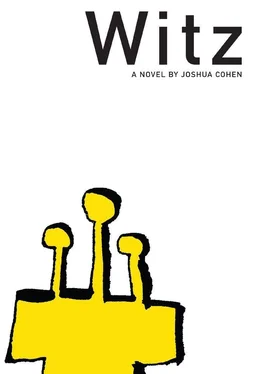Kitsch, what’s to expect: despite how new or improved, however much on-sale or off, everything here, all this stuff, she says, Dreck — it seems old, obsolete, no matter what dated past use. It’s terrible, this being bored not just with yourself but with your own special things, doing what you do every day because you’ve always done it and now you have to, forever (the tunasalad always made with shreds of hardboiled egg; the eggsalad always flecked with paprika — we’ve come to expect nothing less), and that making you feel over, old and done with, as if yourself obsolete, backdated to what my mother had been, what I never wanted to be, what I told myself I’d never become. How I’m kitsch, how everything is…existence itself ’s what she’s thinking, tradition this ritual reliving of what came before, it’s enough: the very moment that a thing begins to exist, is cooked from out of the ether, reduced simmering from the manifest of infinity or any other way’s brought into our world — it’s kitsch already, no ifs about it or buts. Immediate and total, kitsch forever and ever. As who I am, she thinks if with less form, with less apparency than can be evident in the embodied cause of this accusation, my purpose, my standing and station, my wifehood, my motherliness — how it’s just kitsch from the glimmering getgo, from its very idea, as possibility, as potentiality, it’s gone, eternally hopeless, over before it began. That it’s not the frequency, the regularity, the manywashings, the rinse and repeats then stirs again of digital clock time that makes the kitsch, that denies the dreck, births the disappointment, the failure, and so accepts anything as is, that takes on any task, that grants any request, obliges such favors for all: it’s more like my pure being, my Hannaness, she thinks, there you have it, there I have it, here I am but still, nothing but dated and doomed. Thanks a million, come back soon. I might as well make the most of it, though. Might as well follow it through.
Hanna the Bride-Queen, the Queen-Bride, whichever, or both, folded then stirred, into one. Too much for this she thinks too short, heavybreasted body. Two loaves of her rolled, kneekneaded. Stuck in this kitchen as if honeyed to the floor. Now, take all of her worry and thinking and rinse, sprinkle liberally with allegory, just a pinch of parable, pat dry then let sit overnight on the porch amid winter. Wait for the rise. Hanna’s preparing a meal for her intended, for her groom and her king…least she could do. Israel, her husband, and her Messiah, too, in that he might not be a savior but he is always late — forever, I mean, he’s taking forever: he’s been arriving it feels for as ever long as she’s been cooking with the ticker, the timer’s long stilled. A watched pot never boils, only blackens. How once she’d dropped her birthdaywatch in the pot, then went out to buy a new exact one so he wouldn’t think she didn’t like it, or lost. King and groom, whichever I’m saying he’s taking his time. Bound to her bind. And if he’s to be her Messiah, then this kitchen must be her exile, too: as far as dispersions go, luxurious enough, though gone to waste in her longing (the entropic pleasures of a homegym, replete in its deplete with adjoining mediaroom) — houses and schools, then those places of worship known as nondenominational Temples, they ingredient themselves out of mold, whip and whisk themselves up at the outermost rim of the range, the stovetop the manual says, how she’d thrown it away, the accidental trash…lives line the brass burners, burbled from grease, congealed from years fat and day’s oil; roads paved of grout run the length of the middle island, gas and electric link the further exurbs of tiling grid with the hum of the refrigerator hub, lit under the whirring, whirling sky, which is the hood once the bulb’s been replaced. The longing hum of the fridge filling everything with an eerie motion, an activity, a progress, the formica, the metal and tile, sets their mixtures spinning, aswirl, stirring up these new kitchens in new houses grown within and as the eternity of her own kitchen, her old home, rooms hacked out of groutrot, faience, spiced earthenware, and the cupboard with china: kitchens sprouting up from the neglect of her Kitsch (it’s so hard to keep up, it’s so hard to keep up, it’s so difficult), to fill her house, which is the home of the world, with scents of their own, a whirlwind of waft: cooking, she’s cooking still, which is stirring then tasting then stirring again, all the while judiciously laying aside the best cuts for him, for Israel her husband and — and he’ll come, he will, he has to, imminent, it’s arrived, the kiss of his keys at the cheek of the door by the side…when the kitchens’ timers will become aligned — then stop all at once, stilled, their massed ticking will unravel hands of hands both chapped and chaffed, ungloved and how time will mean nothing anymore: no more preheating, defrosting, no more of this letting sit or soak overnights; how everything then will always be ready, in a preparation suspended, preparing into itself, weeping within ever deeper, spices of spices, tastings of tastes, and then, suddenly, the phones ring out on all the lines pitched as softly high as the smokealarm or the light, individually yearning, but when sounded simultaneously bringing only darkness, thick spoiled noise. Grniinrgrginnigr.
He’ll be late.
Goodbye, kiss kiss the hugging of lips, I love you, goodbye, the polymer baby’s replaced in its cradle; and, soon enough, late’s no longer an idea, a recipe’s template or mold made if from scratch, the limited, limiting face of a clock set as wide as time but wound tightly in spite: it’s more like a state, this permanent not — though soon, please, God, I hope soon. If it rings again, let him leave a message.
It’s been given over somewhere or other, I don’t know, go ask your mother, that when you die, and you will, when you leave, finally, this terrestrial kitchen, that you live again, and in some other otherworldly kitchen, and there with every object you ever broke, cracked, destroyed, ruined, or otherwise defiled in your entire life at your disposal, and only those: and so Hanna, to drink her own spoiled milk, deathmilk from Israel’s clubby bachelorhood glasses sharded together from shatter, to sit on a chair missing a leg at a table that wobbles, to gaze out over Paradise from the platesmashed window of her brunchnook, shabby in skirts without knees, frayed hems, heelless solestripped athletic shoes, not so white anymore. At ten in the Eden of morning, an hour she’d almost never wasted in such reflection, with the kinder off at school, Israel at work, she’s at table, at herself idle, not hurting anyone anymore: having destroyed, if only objects, having depossessed possessions, and she herself, dead (the cancerous sunning, the fibrotic breasts, the two lumps ignored, she’d done it to herself, we all do or our parents)…or else, in another interpretation, this is life — and only death is when everything’s fixed, where all’s mended again and made whole: with glue on the seams of mugs, raggedypatches on the elbows of sweaters, sneaky shoelaces tied together to tie once again, with no more worrying knots to finger at numbly, what with the arthritis healed, that third breast lump gone and as for her car, its door’s intact and its fender, too, she’s sure he’ll never notice. And all the promises, all the vows she’s ever made and those that’ve been made for her and to her, fulfilled. And yet she’s still waiting, and waiting.
Though he never promised, just said so: babele, I’m coming…
It’s less him than the pain, hers, though all of it hurts. Tears are her eyes, pregnant pouches. At table, Hanna’s stomach gives a growl. Who can eat…quickly, she doubles herself, folds in, rocks her gut, the loose swell of her emptiness, the bag not paper or plastic but me — cries loudly for help from her kinder, her who never needs help or wants it; this is It. As there’s no answer, and sensing the timing, the ineluctably slow ticktock of the heart, she tilts toward the laundryroom, grabs a rag on her way through the kitchen to the hall — once inside shuts the door, her hand to feel shut the seam.
Читать дальше












